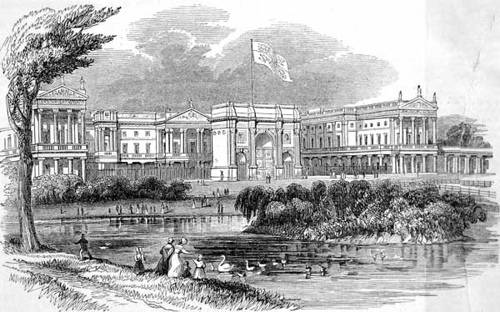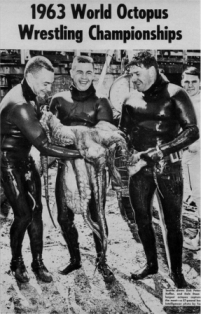What do these words have in common?
- ALMOND
- INCOME
- CANDID
- MEMORIAL
- CONCORDE
- GANYMEDE
- MANDARIN
- MAINLAND
What do these words have in common?

Curious doings at Buckingham Palace, 1838-1841:
This last earned him three more months’ correction, this time with hard labor, and this apparently cured him. But others would follow: In July 1982 Elizabeth II awoke to find 32-year-old Michael Fagan in her bedchamber. “He thinks so much of the Queen,” Fagan’s mother explained. “I can imagine him just wanting to simply talk and say hello and discuss his problems.”
Prometheus angers Zeus, who dispatches an army of demons with these instructions:
And so on. When Prometheus is found dead, the council of gods is displeased, but they find it impossible to identify the guilty demon — any suspect can point to an infinity of demons who must have acted before him. Must Zeus go free?
A wandering tribe, called the Siouxs,
Wear moccasins, having no shiouxs.
They are made of buckskin,
With the fleshy side in,
Embroidered with beads of bright hyiouxs.
When out on the war-path, the Siouxs
March single file–never by tiouxs–
And by “blazing” the trees
Can return at their ease,
And their way through the forests ne’er liouxs.
All new-fashioned boats he eschiouxs,
And uses the birch-bark caniouxs;
These are handy and light,
And, inverted at night,
Give shelter from storms and from dyiouxs.
The principal food of the Siouxs
Is Indian maize, which they briouxs,
And hominy make,
Or mix in a cake,
And eat it with pork, as they chiouxs.
Now, doesn’t this spelling look cyiouxrious?
‘Tis enough to make any one fyiouxrious!
So a word to the wise!
Pray our language revise
With orthography not so injiouxrious.
— Charles Follen Adams

On Feb. 5, 1958, during a simulated combat mission near Savannah, Ga., a B-47 bomber collided with an F-86 fighter. The fighter crashed; the bomber, barely airworthy, needed to reduce weight to avoid an emergency landing.
So it dropped a 7,600-pound nuclear bomb.
The bomb contained 400 pounds of conventional explosives and highly enriched uranium. There’s some disagreement as to whether it included the plutonium capsule needed to start a nuclear reaction.
That’s rather important, because in 50 years of searching the Air Force still hasn’t found the bomb. It hit the water near Tybee Island off the Georgia coast and is presumably buried in 10 feet of silt somewhere in Wassaw Sound. But exactly where it is, and how dangerous it is, remain unknown.
Imaginary patrons of Jersey City’s Tube Bar paged by owner Louis “Red” Deutsch at the request of telephone pranksters John Elmo and Jim Davidson in the mid-1970s:
Elmo and Davidson recorded Deutsch’s earnest pages and the wild, vituperative threats that followed when he realized he’d been had. In the 1980s the tapes began to circulate among professional sports leagues and eventually found their way to animator Matt Groening … who turned them into a running gag on The Simpsons.
mytacism
n. excessive use of the letter M
My Madeline! my Madeline!
Mark my melodious midnight moans,
Much may my melting music mean,
My modulated monotones.
My mandolin’s mild minstrelsy,
My mental music magazine,
My mouth, my mind, my memory,
Must mingling murmur “Madeline.”
Muster ‘mid midnight masquerade,
Mark Moorish maidens, matrons’ mien;
‘Mongst Murcia’s most majestic maids,
Match me my matchless Madeline.
Mankind’s malevolence may make
Much melancholy musing mine;
Many my motives may mistake,
My modest merits much malign.
My Madeline’s most mirthful mood
Much mollifies my mind’s machine;
My mournfulness’s magnitude
Melts–make me merry, Madeline!
Match-making ma’s may machinate,
Manoeuvring misses me misween;
Mere money may make many mate,
My magic motto’s “Madeline.”
Melt, most mellifluous melody,
‘Midst Murcia’s misty mounts marine;
Meet me ‘mid moonlight–marry me,
Madonna mia! My Madeline!
— Walter Parke, “A Mellifluous Madrigal,” Ballou’s Monthly Magazine, January 1888

Man’s greatest curse, it seems, is that he is easily bored. In the 1960s, a novelty-starved Washington state televised the World Octopus Wrestling Championships, in which each contestant would dive into Puget Sound, grab a North Pacific giant octopus, and try to haul it to the surface.
This would be difficult even for a real wrestler; H. Allen Smith pointed out that “it is impossible for a man with two arms to apply a full nelson on an octopus,” much less to apply a crotch hold on an opponent with eight crotches. Plus the giant octopus can grow to 90 pounds.
But nothing can stop a fad. In April 1963, 5,000 spectators watched 111 divers draw 25 surprised octopuses pointlessly out of the sound, after which the creatures were released, eaten, or donated to a local aquarium. The octopuses had no comment; perhaps they’re planning a comeback match.

An Irishman, being ask’d if he understood French? Reply’d, Yes, Joy, I understand French perfectly well, provided it’s spoken in Irish.
— The Jester’s Magazine, February 1766